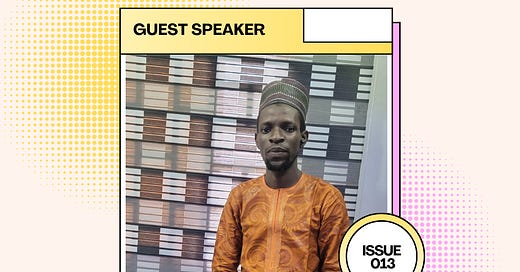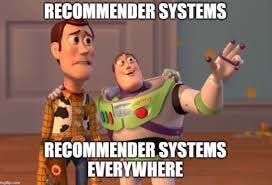Issue 013 - Meet Muhammad Abiodun
I’ve been fortunate to have incredible managers who, without explicitly being mentors, have guided me with their experience and insights.
Meet Muhammad Abiodun Sulaiman, a Machine Learning Engineer at Data Science Nigeria. Muhammad’s journey into the world of data started with a career in software development and process automation, he quickly discovered the transformative potential of data to empower decision-making and optimize processes.
Muhammad’s career has been defined by his drive to explore, adapt, and create impactful solutions. From leading projects like recommendation engines to fostering data-driven decision-making within teams, he seamlessly blends technical expertise with creativity and user empathy.
What inspired you to pursue a career in data, and how has your motivation evolved over time?
My journey into the data field has been driven by a mix of curiosity and a deep interest in how data can empower decision-making and streamline processes, especially in tech-driven environments. Starting with roles in software development and process automation, I witnessed the transformative power of data in converting raw information into actionable insights.
Over time, as I worked with advanced tools like FastAPI, machine learning models, and database systems, my motivation evolved from leveraging data for answers to using it to predict trends and build scalable solutions. Today, my passion lies in creating impactful systems that drive business outcomes and enhance user experiences.
FastAPI is like a super-efficient assistant that helps you build apps that allow computers to talk to each other over the internet. These apps are called APIs (Application Programming Interfaces).
Imagine you own a pizza delivery service, and you want customers to order online. FastAPI would be like the system that takes orders from your website or app, checks the pizza menu, processes the order, and tells the kitchen what to make—all super quickly and accurately.
It’s fast, simple to use, and makes sure everything works smoothly, so your "pizza service" (or app) runs efficiently without mistakes.
If you have a recommendation for who we should be speaking to, or who you would like to see in this interview series, reply with their names, data specialty, and how we can reach them (LinkedIn, Email, Phone, X Handle)
Can you share a pivotal moment in your career that significantly shaped your approach to data?
A pivotal moment was leading a project to develop a recommendation engine. This experience pushed me beyond standard data practices into machine learning and predictive analytics. While building the model, I realized the importance of understanding user behavior and ensuring scalability for real-world data.
This project taught me to view data as more than numbers, it’s a tool to anticipate user needs and create tailored solutions. It also emphasized the value of empathy for end users, a perspective that has shaped every data project I’ve worked on since.
How do you foster a culture of data-driven decision-making within your team or organization?
I promote data-driven decision-making through education, accessibility, and collaboration. By leading with data in my own decisions and openly discussing the insights, I demonstrate its value.
I create user-friendly dashboards and visualizations to make data accessible to all team members, regardless of their technical background. Regular data workshops help the team understand metrics and align them with strategic goals. Collaboration across departments ensures that data becomes a shared language for solving problems and driving success.
What do you love outside of data?
Outside of data, I’m passionate about mentoring, exploring new technologies, and continuous learning through reading and personal growth. I also enjoy staying active outdoors and traveling, which broadens my perspective and fuels creativity.
What resources (books, courses, tools) do you recommend for people to level up their skills?
Here are some excellent resources I'd recommend for those looking to level up in data and tech skills:
📚 Books:
Data Science for Business by Foster Provost and Tom Fawcett
Hands-On Machine Learning by Aurélien Géron
Storytelling with Data by Cole Nussbaumer Knaflic
Deep Learning by Ian Goodfellow
🎓 Courses:
Machine Learning by Andrew Ng (Coursera)
Fast.ai’s Practical Deep Learning for Coders
🛠️ Tools:
Python, SQL, and Power BI for analysis and visualization
Git for version control
Cloud platforms like AWS and Google Cloud for scalable solutions
🌐 Communities:
Kaggle, GitHub, and Young Data Professionals for networking and skill-building
Each of these resources has made a lasting impact on my approach to data, from solidifying technical fundamentals to enhancing how I communicate insights. They not only provide knowledge but also help foster an applied, hands-on experience with real-world data and projects.
How do you balance the technical aspects of your role with the need for creative problem-solving?
Technical expertise provides the foundation for my work, but creativity drives impactful solutions. For example, while developing a recommendation engine, the technical task was to build a model. The creative challenge was to personalize it for diverse user needs, address edge cases, and ensure long-term adaptability.
I break projects into manageable components, balancing structured problem-solving with room for creativity. This approach ensures solutions are technically sound while meeting unique challenges with innovative ideas.
Can you discuss a project where data insights led to unexpected outcomes or revelations?
One project involved analyzing customer behavior for a digital product. Initially, we assumed higher engagement equated to stronger retention. However, we discovered that users with lower engagement metrics were often the most loyal.
These users quickly found value in their interactions, requiring fewer but highly effective sessions. This insight transformed our strategy, shifting our focus from maximizing engagement to ensuring efficient and valuable user experiences. It reinforced the importance of keeping an open mind in data analysis.
What role does mentorship play in your career, and how have mentors influenced your journey?
Mentorship has been transformative in my career. Early on, a mentor taught me to approach data projects strategically, focusing not only on technical aspects but also on aligning solutions with business goals.
Later, another mentor introduced me to advanced DevOps practices like CI/CD, enhancing my ability to build scalable solutions. Inspired by their guidance, I now mentor junior professionals, sharing technical expertise and problem-solving strategies to help them grow and succeed.
Can you reflect on a setback in your data career and what you learned from it?
One significant setback occurred during a predictive modeling project. While the model performed well during testing, it failed to deliver consistent results in real-world conditions.
This taught me to prioritize flexibility and continuous validation in data projects. I now work closely with stakeholders to align projects with practical realities, ensuring robust and adaptable solutions that meet real-world demands.
What are some key skills that are often overlooked in your field of data?
Problem Framing: Understanding the "why" behind data analysis ensures solutions align with business priorities.
Data Storytelling: Communicating complex insights in an accessible way bridges the gap between data and decision-making.
Resilience: Adapting to unexpected challenges is essential in data science, where roadblocks are common.
Ethics: Developing fair and transparent AI solutions is increasingly critical.
Version Control: Tracking code and models ensures reproducibility and long-term reliability.
Key Takeaways
Curiosity Drives Innovation: Muhammad’s passion for understanding and leveraging data has fueled his transition from software development to machine learning engineering.
Technical Expertise Meets Empathy: His ability to blend advanced technical skills with a deep understanding of user needs has enabled him to build impactful solutions.
The Power of Mentorship: Muhammad’s journey highlights the transformative role of mentors and his commitment to paying it forward by guiding future data professionals.
Resilience and Adaptability: Learning from setbacks has sharpened his ability to deliver robust, real-world solutions.
A Holistic Approach: Muhammad emphasizes the importance of problem framing, data storytelling, and ethical AI, showcasing the multi-dimensional nature of success in data science.
Bit of this | Bit of that
Did you miss our webinar, "From Zero to Hero: Building Real Experience Through Winning Hackathons," or want to rewatch it? The recording is now available!
👉 Watch it here: Behind The Data Webinars
ICYMI: Catch Up on Previous Issues
Best,
Ayoade Adegbite
Founder, Behind the Data












Nice read and thanks for the reading suggestions